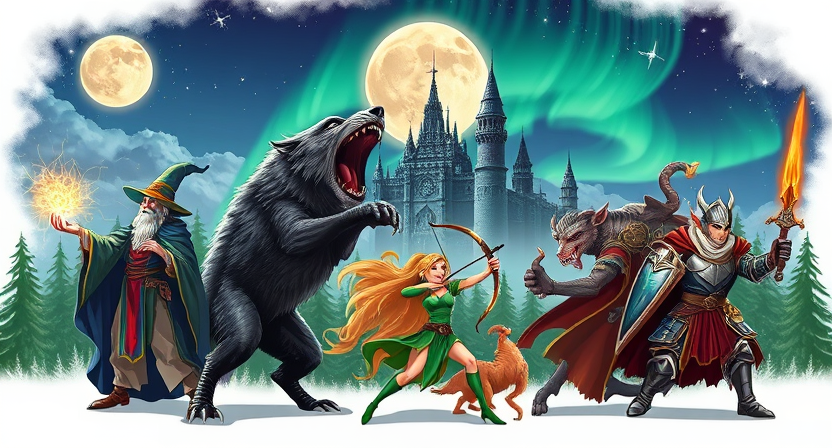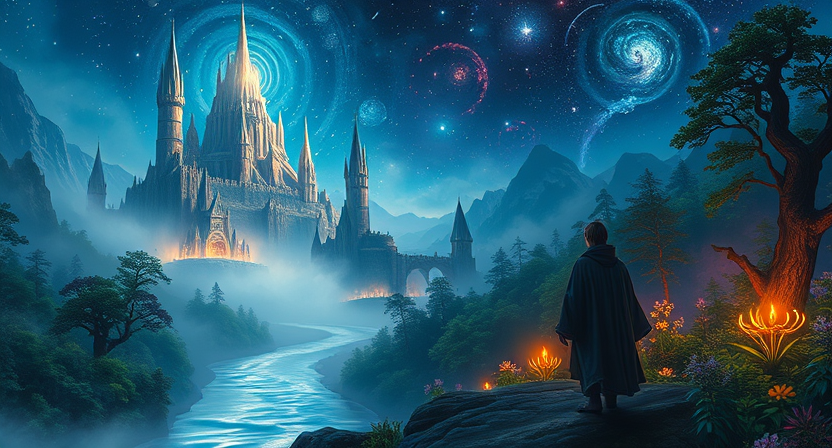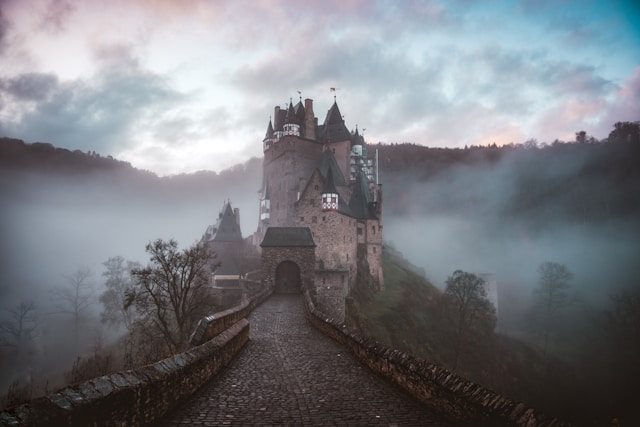Exploring the Origins of Fantasy Series

Fantasy series have a rich and diverse history that can be traced back to ancient mythology and folklore. These fantastical stories were often passed down orally, captivating audiences with tales of heroes, monsters, and magic. As time progressed, the tradition of weaving fantastical elements into narratives continued, evolving into the structured format of fantasy series that we are familiar with today.
The roots of fantasy series can also be found in classic literature, where authors like J.R.R. Tolkien and C.S. Lewis introduced readers to intricate worlds filled with fantastical creatures and epic quests. Their works, such as “The Lord of the Rings” and “The Chronicles of Narnia,” set the foundation for the modern fantasy genre, inspiring generations of writers to explore new realms of imagination and creativity. Through the works of these pioneering authors, the origins of fantasy series were firmly established, laying the groundwork for the captivating stories that continue to enchant readers worldwide.
• Fantasy series have a rich history rooted in ancient mythology and folklore
• These fantastical stories were initially passed down orally, captivating audiences with tales of heroes, monsters, and magic
• Authors like J.R.R. Tolkien and C.S. Lewis introduced readers to intricate worlds filled with fantastical creatures and epic quests
• Works such as “The Lord of the Rings” and “The Chronicles of Narnia” set the foundation for the modern fantasy genre
• The origins of fantasy series were firmly established by these pioneering authors, inspiring generations of writers
The Evolution of Magical Creatures in Fantasy Literature

The portrayal of magical creatures in fantasy literature has undergone a remarkable transformation over the years. From the majestic dragons and fierce griffins of ancient myths to the whimsical unicorns and mischievous fairies of fairy tales, these fantastical beings have captured the imagination of readers for centuries. As the genre of fantasy literature has evolved, so too have the roles and characteristics of these magical creatures, reflecting the changing themes and narratives of the stories they inhabit.
In contemporary fantasy literature, authors have taken creative liberties in reimagining traditional magical creatures and inventing new ones altogether. From J.K. Rowling’s imaginative creatures in the “Harry Potter” series to George R.R. Martin’s dark and complex beasts in “A Song of Ice and Fire,” these fantastical beings play pivotal roles in shaping the worlds in which they exist. The evolution of magical creatures in fantasy literature not only showcases the boundless creativity of authors but also serves as a mirror to the societal values and beliefs that influence the stories we tell.
• One of the most iconic magical creatures in fantasy literature is the dragon, which has been depicted as both a fearsome beast and a wise guardian throughout different works.
• Fairies, once portrayed as delicate beings with ethereal beauty, have evolved to encompass a wide range of personalities and powers in contemporary fantasy literature.
• The introduction of new magical creatures such as house-elves and dementors in modern fantasy novels adds depth and complexity to the worlds created by authors.
• By reimagining traditional mythical creatures or inventing entirely new ones, authors are able to explore themes of power, identity, and morality within their stories.
Unveiling the Intricate World-Building in Fantasy Series

World-building is a fundamental element of fantasy literature, serving as the creative backbone that brings fictional worlds to life. Authors meticulously craft intricate settings, societies, and cultures, weaving together intricate details to transport readers to fantastical realms beyond imagination. From towering castles and enchanted forests to mystical creatures and magical systems, every aspect of world-building in fantasy series is carefully constructed to immerse readers in a rich and immersive storytelling experience.
Through skillful world-building, authors are able to establish a sense of depth and authenticity within their fantasy realms, making them feel tangible and believable to readers. By intricately planning out the geography, history, politics, and customs of their fictional worlds, writers create a cohesive and immersive backdrop against which their stories can unfold. The attention to detail in world-building not only enhances the fantastical elements of a narrative but also adds layers of complexity and nuance that enrich the overall reading experience for fans of the fantasy genre.
• World-building is a fundamental element of fantasy literature
• Authors meticulously craft intricate settings, societies, and cultures
• From towering castles to mystical creatures, every aspect is carefully constructed
• Establishes a sense of depth and authenticity within the fantasy realms
• Attention to detail enhances the fantastical elements of a narrative
Analyzing the Role of Mythology in Fantasy Narratives

Mythology plays a crucial role in shaping the narratives of fantasy stories. Drawing upon ancient tales and legends, fantasy authors weave intricate worlds and complex characters that resonate with readers. By incorporating elements of mythology, these stories often explore themes of heroism, sacrifice, and destiny, adding depth and richness to the overall narrative.
Through the use of mythological motifs and archetypes, fantasy writers create a sense of familiarity and universality in their storytelling. Whether drawing inspiration from Greek, Norse, or Celtic mythology, these narratives often feature gods, goddesses, and epic battles between forces of good and evil. By tapping into the collective unconscious and timeless themes found in mythology, fantasy authors are able to craft tales that captivate and inspire readers across generations.
• Mythology plays a crucial role in shaping the narratives of fantasy stories
• Fantasy authors weave intricate worlds and complex characters drawing upon ancient tales and legends
• Themes of heroism, sacrifice, and destiny are often explored in fantasy stories through mythology
• Mythological motifs and archetypes create a sense of familiarity and universality in storytelling for fantasy writers
• Gods, goddesses, epic battles between forces of good and evil are common elements inspired by mythology in fantasy narratives.
The Influence of Folklore on Fantasy Series

Fantasy series have long been enriched by the colorful tapestry of folklore that threads through their narratives. These ancient tales and folklore traditions have served as a wellspring of inspiration for authors, weaving a sense of familiarity and nostalgia into the fantastical realms they create. From mythical creatures to legendary heroes, folklore elements infuse fantasy series with a sense of depth and authenticity, grounding readers in a world that feels both fantastical and strangely familiar.
By drawing on the rich tapestry of folklore, fantasy series not only pay homage to the cultural heritage of different societies but also provide a sense of continuity with the past. Through the incorporation of age-old myths and legends, authors tap into universal themes and archetypes that resonate across time and cultures, creating stories that feel timeless and relevant to readers of all ages. The influence of folklore in fantasy series serves to connect readers to the collective unconscious, evoking a sense of wonder and enchantment that transcends the boundaries of reality.
• Folklore elements in fantasy series provide a sense of familiarity and nostalgia for readers
• Mythical creatures and legendary heroes from folklore add depth and authenticity to fantastical realms
• Incorporation of age-old myths and legends creates stories that feel timeless and relevant
• Authors tap into universal themes and archetypes through folklore, resonating across time and cultures
• The influence of folklore connects readers to the collective unconscious, evoking wonder and enchantment
Examining the Growth of Fantasy Subgenres

In recent years, the world of fantasy literature has experienced a surge in the development of various subgenres. These subgenres offer readers diverse and innovative storytelling experiences that cater to different preferences and tastes within the broader fantasy genre. From epic fantasy to urban fantasy, from dark fantasy to paranormal romance, the growth of fantasy subgenres has enriched the literary landscape and captivated audiences around the globe.
Each subgenre brings its own unique blend of themes, tropes, and magical elements that set it apart from traditional fantasy narratives. Writers have embraced this diversity by experimenting with hybrid subgenres, creating new and exciting worlds that push the boundaries of conventional genre conventions. As readers seek fresh and immersive narratives, the growth of fantasy subgenres continues to expand, offering an endless array of imaginative possibilities to explore.
• Epic fantasy remains a popular subgenre, known for its vast world-building and epic quests
• Urban fantasy blends fantastical elements with modern settings, appealing to readers who enjoy a mix of magic and reality
• Dark fantasy delves into the darker aspects of human nature and often features morally ambiguous characters
• Paranormal romance combines elements of romance with supernatural beings such as vampires and werewolves
As the demand for diverse storytelling grows, authors are constantly innovating within these subgenres to keep readers engaged. The evolution of fantasy subgenres reflects the ever-changing tastes and preferences of audiences, pushing boundaries and challenging traditional narratives. Whether you prefer dragons and knights or witches in contemporary cities, there is a fantasy subgenre out there waiting to transport you to another world filled with magic and adventure.
Diving Into the Complex Characters of Fantasy Series

In the vast realm of fantasy series, complex characters serve as the beating heart of many narratives. These characters are meticulously crafted with layers of depth, making them resonate with readers on a profound level. From conflicted anti-heroes grappling with their inner demons to cunning villains driven by their motives, the characters in fantasy series are as diverse as the worlds they inhabit.
Readers are drawn to these intricate characters for their relatability and the complexities that mirror the nuances of human nature. Through their trials and triumphs, these characters navigate moral dilemmas, face inner conflicts, and evolve in captivating ways. Whether they are wielding magical powers or embarking on epic quests, the journey of these characters captivates readers and adds a richness to the tapestry of fantasy storytelling.
• Complex characters in fantasy series are the beating heart of many narratives
• Meticulously crafted with layers of depth
• Resonate with readers on a profound level
• Diverse characters from conflicted anti-heroes to cunning villains
• Drawn to these intricate characters for their relatability and complexities mirroring human nature
In the realm of fantasy series, complex characters play a crucial role in driving the narrative forward and keeping readers engaged. These characters are not merely black-and-white archetypes but rather multifaceted individuals with their own motivations, flaws, and struggles. As readers follow their journeys, they become emotionally invested in their growth and transformation over the course of the story.
• Characters navigate moral dilemmas and face inner conflicts
• Evolve in captivating ways throughout the narrative
• Wielding magical powers or embarking on epic quests adds richness to storytelling
• Readers are captivated by the journey of these characters
Ultimately, it is the complexity and depth of these characters that elevate fantasy series beyond mere escapism into thought-provoking explorations of humanity, morality, and personal growth. As readers immerse themselves in these richly developed worlds populated by compelling characters, they find themselves reflecting on their own lives and choices through the lens of fantastical storytelling.
Unraveling the Themes and Motifs in Fantasy Literature

Fantasy literature is a genre rich with themes and motifs that captivate readers and draw them into magical worlds filled with wonder and imagination. One prevalent theme often explored in fantasy literature is the classic struggle between good and evil, where heroes must face formidable villains in epic battles of morality. This dichotomy between light and darkness not only adds depth to the narrative but also serves as a reflection of the eternal conflict within human nature.
Another common motif in fantasy literature is the hero’s journey, a timeless narrative archetype that follows the protagonist as they embark on a transformative quest filled with challenges and trials. This motif of self-discovery and growth resonates with readers as they witness characters overcome obstacles, confront their fears, and ultimately emerge as changed individuals. The hero’s journey serves as a universal motif that transcends cultures and time periods, highlighting the enduring appeal of this literary theme in captivating audiences across generations.
• The struggle between good and evil adds depth to the narrative
• Heroes facing formidable villains in epic battles of morality
• Reflects the eternal conflict within human nature
• The hero’s journey is a common motif in fantasy literature
• Follows the protagonist on a transformative quest filled with challenges
• Characters overcoming obstacles, confronting fears, and emerging as changed individuals
Fantasy literature continues to enchant readers with its exploration of themes and motifs that resonate across cultures and time periods. Whether delving into the classic struggle between good and evil or following the hero’s journey of self-discovery, these narratives captivate audiences with their timeless appeal. As readers immerse themselves in magical worlds filled with wonder and imagination, they are drawn into stories that not only entertain but also provoke thought and reflection on the complexities of human nature.
Discussing the Impact of Technology on Modern Fantasy Series

Technology has undeniably left its mark on modern fantasy series, shaping the way authors craft their fantastical worlds and narratives. From the incorporation of advanced magical devices to the portrayal of futuristic civilizations, technology has become an integral aspect of many contemporary fantasy stories. The blending of magic and technology in these series adds a unique layer of complexity and intrigue, enticing readers with imaginative concepts that push the boundaries of traditional fantasy storytelling.
Furthermore, the impact of technology on modern fantasy series is evident in the portrayal of characters who wield technological advancements alongside magical powers. This fusion of science and magic creates a dynamic and evolving landscape within the fantasy genre, allowing for endless possibilities and innovative storytelling. As authors continue to explore the intersection of technology and fantasy, readers are treated to a rich tapestry of worlds where the fantastic and the futuristic coexist in captivating harmony.
• The incorporation of advanced magical devices adds a new dimension to fantasy worlds
• Portrayal of futuristic civilizations offers a fresh perspective on world-building
• Blending magic and technology creates complex and intriguing narratives
• Characters wielding both technological advancements and magical powers bring depth to the story
Exploring the Intersection of Fantasy and Reality in Literature

Fantasy literature has long been a realm where imagination knows no bounds, crafting worlds and characters that defy the constraints of reality. Through fantastical narratives, authors invite readers to embark on journeys that blend the fantastical with the real, blurring the lines between what is possible and what is merely a product of the mind’s eye. These stories often serve as a mirror to our own world, reflecting societal issues and human emotions in a way that is both familiar and yet delightfully otherworldly.
By intertwining elements of fantasy with threads of reality, authors create a tapestry of storytelling that resonates with readers on multiple levels. These narratives offer a unique lens through which to explore complex themes and ideas, providing a fresh perspective on the human experience. In this intersection of fantasy and reality, readers are not only entertained but also challenged to contemplate the intricacies of life and the world around them in a new and captivating light.
• The blending of fantasy and reality in literature allows for exploration of complex themes
• Authors use fantastical elements to reflect societal issues and human emotions
• Readers are invited to contemplate the intricacies of life through a fresh perspective
• Fantasy literature serves as a mirror to our own world, offering both familiarity and otherworldly delight
Delving Into the Psychology of Fantasy Characters

Within the realm of fantasy literature, the psychology of characters plays a pivotal role in shaping the narrative landscape. Characters in fantasy stories often grapple with inner conflicts, external challenges, and moral dilemmas that mirror the complexities of human nature. Through the exploration of their fears, desires, and motivations, these characters come to life on the pages, captivating readers and immersing them in the fantastical worlds crafted by the author.
By delving into the psychology of fantasy characters, authors have the opportunity to create multi-dimensional and relatable protagonists and antagonists. Whether it is the hero’s journey of self-discovery or the villain’s descent into darkness, the psychological depth of these characters adds depth and richness to the story. Readers are drawn to characters who mirror their own struggles and triumphs, making the exploration of psychology a crucial aspect of crafting compelling and memorable fantasy narratives.
• Characters in fantasy stories often grapple with inner conflicts, external challenges, and moral dilemmas that mirror the complexities of human nature.
• Through the exploration of their fears, desires, and motivations, these characters come to life on the pages.
• Delving into the psychology of fantasy characters allows authors to create multi-dimensional and relatable protagonists and antagonists.
• The hero’s journey of self-discovery or the villain’s descent into darkness adds depth and richness to the story.
• Readers are drawn to characters who mirror their own struggles and triumphs.
The Representation of Good vs. Evil in Fantasy Series

Good and evil are fundamental themes that have permeated fantasy series throughout literary history. In many fantasy narratives, the dichotomy between good and evil is portrayed through morally contrasting characters who embody these opposing forces. Heroes are often depicted as virtuous and selfless beings, driven by a sense of justice and a desire to protect the weak. On the other hand, villains are characterized by their malevolence and desire for power, often willing to exploit others for their own gain.
The dynamic interplay between good and evil serves to create tension and conflict within fantasy series, driving the plot forward and engaging readers in the struggle between opposing forces. Through the depiction of moral dilemmas and ethical choices faced by characters, authors explore the complexities of human nature and the blurred lines between right and wrong. Ultimately, the representation of good vs. evil in fantasy series not only entertains audiences but also provokes reflection on the nature of morality and the choices we make in the face of adversity.
• In many fantasy narratives, the dichotomy between good and evil is portrayed through morally contrasting characters
• Heroes are often depicted as virtuous and selfless beings driven by a sense of justice
• Villains are characterized by their malevolence and desire for power
• The dynamic interplay between good and evil creates tension and conflict within fantasy series
• Authors explore the complexities of human nature through moral dilemmas faced by characters
The Significance of Magic Systems in Fantasy Worlds

Magic systems play a crucial role in shaping the fantastical worlds found in fantasy literature. These systems are not just about the spells and enchantments characters wield, but also about the underlying rules and laws that govern the use of magic. By establishing clear guidelines for how magic works within a world, authors can create a sense of consistency and believability that enhances the overall reading experience.
Furthermore, magic systems often serve as a reflection of the societies and cultures within a fantasy world. The way magic is perceived, controlled, and utilized can shed light on power dynamics, values, and beliefs held by different characters or factions. Through the intricacies of magic systems, authors can explore complex themes such as morality, ambition, and the consequences of wielding supernatural abilities.
• Magic systems create a sense of consistency and believability in fantasy worlds
• They establish rules and laws governing the use of magic
• Reflect societies and cultures within a fantasy world
• Shed light on power dynamics, values, and beliefs held by characters or factions
• Allow authors to explore complex themes such as morality, ambition, and consequences
Analyzing the Role of Prophecy in Fantasy Narratives

Prophecies have long been a staple element in the realm of fantasy narratives, serving as a powerful tool to drive the plot forward and add an air of mystery and inevitability to the story. In many fantasy worlds, prophecies are often cryptic and open to interpretation, creating a sense of anticipation and suspense as readers follow the characters’ journey to fulfill or defy their predetermined fate.
The role of prophecy in fantasy narratives goes beyond mere plot devices, often delving into deeper themes of destiny, free will, and the nature of power. By introducing prophecies into their stories, authors are able to explore the concepts of fate and choice, and how characters navigate the paths laid out for them by unseen forces. Prophecies can also serve as a source of conflict, as characters may struggle to accept or reject the visions of their future, leading to moral dilemmas and personal growth throughout their journey.
• Prophecies add an element of mystery and anticipation to the story
• They drive the plot forward and create suspense for readers
• Authors use prophecies to explore themes of destiny, free will, and power
• Characters often face moral dilemmas when dealing with their prophesied fate
• Prophecies can lead to personal growth and development for characters as they navigate their predetermined paths
The Exploration of Diversity in Fantasy Series

Diversity in fantasy series encompasses a wide array of elements that contribute to the richness and complexity of these fictional worlds. From characters of different races, cultures, and backgrounds to fantastical creatures and magical beings, diversity adds depth and authenticity to the narrative landscape. By including diverse perspectives and experiences, authors have the opportunity to explore themes of identity, power dynamics, and societal structures within their fantastical realms.
Fantasy series can serve as a mirror to our own world, reflecting the complexities and nuances of human diversity. Through the portrayal of characters with varying abilities, gender identities, and beliefs, these stories offer readers a chance to engage with and understand different viewpoints. Embracing diversity in fantasy literature not only fosters inclusivity and representation but also allows for a more immersive and thought-provoking reading experience for audiences of all backgrounds.
• Characters of different races, cultures, and backgrounds
• Fantastical creatures and magical beings
• Themes of identity, power dynamics, and societal structures
• Characters with varying abilities, gender identities, and beliefs
• Inclusivity and representation in fantasy literature
Unpacking the Symbolism in Fantasy Literature

Symbolism plays a crucial role in enriching the depth and meaning of fantasy literature. From ancient myths to modern sagas, writers have utilized symbolism to imbue their stories with layers of significance. Through the use of symbols such as the sword representing courage or the moon symbolizing mystery, fantasy authors create a nuanced narrative that resonates with readers on a subconscious level.
Furthermore, symbolism in fantasy literature often serves to underscore the themes and motifs explored in the story. Whether it is a recurring motif like the hero’s journey or a symbol that represents a character’s internal struggle, these symbolic elements add a level of complexity to the narrative. By decoding the symbolic language woven into the fabric of fantasy worlds, readers can unravel deeper meanings and appreciate the intricacies of the author’s craft.
• Symbolism enhances the depth and meaning of fantasy literature
• Symbols like swords and moons add layers of significance to stories
• Symbolism underscores themes and motifs in the narrative
• Decoding symbolic language helps readers appreciate the author’s craft
Discussing the Importance of World-Building in Fantasy Series

World-building is a crucial aspect in the creation of fantasy series. It serves as the foundation upon which the narrative unfolds, providing readers with a rich and immersive setting that allows them to escape into a world unlike our own. Through intricate world-building, authors have the opportunity to craft unique landscapes, cultures, and histories that form the backdrop for their characters’ journeys and adventures.
Furthermore, world-building in fantasy series plays a significant role in shaping the overall tone and atmosphere of the story. By developing a detailed and coherent world, authors can transport readers into a realm filled with magic, mystery, and wonder. This immersive experience not only captivates the audience but also enhances their connection to the characters and plot, making the fantastical elements feel tangible and believable.
• World-building provides a rich and immersive setting for readers to escape into
• Authors can craft unique landscapes, cultures, and histories through intricate world-building
• It shapes the overall tone and atmosphere of the story
• Detailed and coherent world transports readers into a realm filled with magic, mystery, and wonder
• Enhances connection to characters and plot by making fantastical elements feel tangible
The Rise of Strong Female Protagonists in Fantasy Stories

In recent years, there has been a noticeable surge in the portrayal of strong female protagonists in fantasy stories. These characters are no longer confined to secondary roles or traditional stereotypes but are emerging as central figures driving the narrative forward with their courage, intelligence, and resilience. Authors are actively challenging gender norms and empowering readers by presenting multidimensional female characters who defy expectations and embody a strong sense of agency in their quests and adventures.
The rise of strong female protagonists in fantasy stories reflects a shift towards more inclusive and diverse representations in the genre. By showcasing women in leadership roles and as formidable warriors or powerful magic wielders, these narratives not only provide much-needed representation for female readers but also send a powerful message about equality and empowerment. Through these characters, readers are invited to explore themes of identity, strength, and overcoming adversity, creating a richer and more nuanced storytelling experience in the world of fantasy literature.
• Female protagonists are no longer confined to secondary roles or traditional stereotypes
• Authors are actively challenging gender norms and empowering readers
• Characters defy expectations and embody a strong sense of agency in their quests and adventures
• Representation of women in leadership roles and as formidable warriors or powerful magic wielders is on the rise
• These narratives provide much-needed representation for female readers
• Themes of identity, strength, and overcoming adversity are explored through these characters
Exploring the Role of Quests in Fantasy Narratives

Embarking on a quest is a fundamental element in many fantasy narratives, serving as a driving force that propels the storyline forward. These quests often revolve around a hero or group of characters venturing into the unknown, facing various challenges and obstacles along the way. Whether it is to defeat a dark lord, retrieve a powerful artifact, or save a kingdom from destruction, quests infuse a sense of adventure and purpose into the narrative, capturing the readers’ imagination and keeping them engaged throughout the journey.
Within the realm of fantasy literature, quests not only serve as a means for characters to achieve their goals but also provide an opportunity for personal growth and development. As characters navigate through the trials and tribulations of their quest, they are forced to confront their fears, overcome weaknesses, and demonstrate courage and resilience in the face of adversity. The challenges encountered during the quest often test the characters’ morals, values, and beliefs, leading to profound transformations that shape their identities and redefine their destinies. In essence, quests in fantasy narratives serve as a crucible in which characters are forged, evolving from mere individuals into heroes of legend.
• Embarking on a quest is a fundamental element in many fantasy narratives
• Quests often revolve around a hero or group of characters venturing into the unknown
• Challenges and obstacles are faced along the way, adding to the adventure
• Quests infuse a sense of purpose into the narrative, keeping readers engaged
• Quests provide an opportunity for personal growth and development for characters
• Characters must confront fears, overcome weaknesses, and demonstrate courage
• The challenges encountered during quests test morals, values, and beliefs
• Characters undergo profound transformations that shape their identities
In conclusion, quests play a crucial role in fantasy narratives by driving the storyline forward, providing opportunities for character growth and development. Through facing challenges and overcoming obstacles, characters evolve from ordinary individuals into legendary heroes. The journey embarked upon during quests captures readers’ imaginations and keeps them engaged as they witness the transformation of characters throughout their adventures.
The Enduring Popularity of Fantasy Series

Fantasy series have captured the hearts and imaginations of readers for generations, transporting them to realms filled with magic, mythical creatures, and epic adventures. The enduring popularity of these series can be attributed to their ability to offer an escape from reality and provide a sense of wonder and excitement to readers of all ages. Whether it’s the intricate world-building, complex characters, or themes of good versus evil, fantasy series continue to captivate audiences with their rich storytelling and imaginative landscapes.
With the rise of strong female protagonists, diverse character representations, and intricate magic systems, fantasy series have evolved to embrace a wide range of perspectives and experiences. This inclusivity has further contributed to the enduring popularity of the genre, allowing readers to see themselves reflected in the pages of these fantastical worlds. As new subgenres emerge and storytelling techniques continue to innovate, fantasy series are poised to remain a beloved staple of literature for years to come.
• Fantasy series offer readers an escape from reality
• Intricate world-building and complex characters captivate audiences
• Themes of good versus evil provide a sense of wonder and excitement
• Rise of strong female protagonists and diverse character representations in the genre
• Inclusivity allows readers to see themselves reflected in fantastical worlds
• New subgenres and innovative storytelling techniques keep fantasy series relevant




